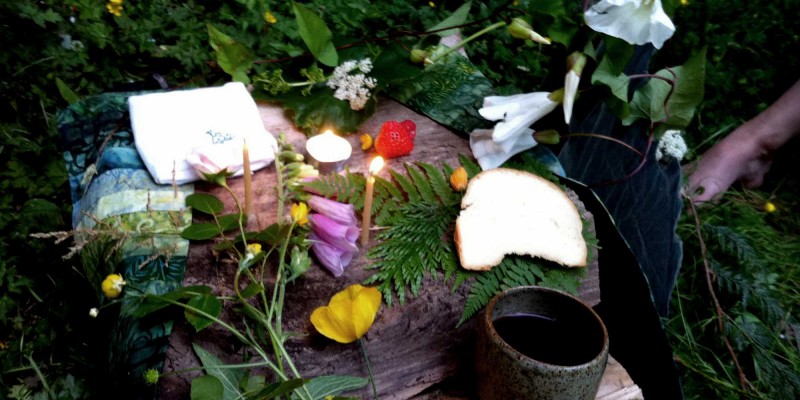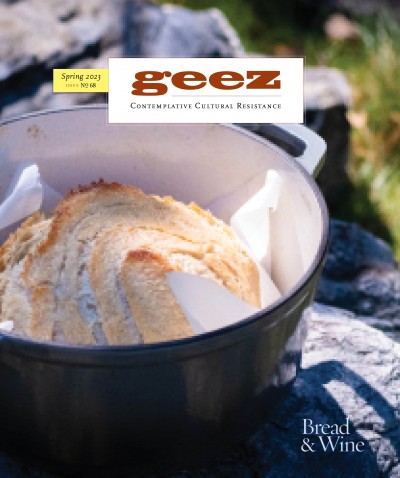The Oak Tree of Life and the Body of Christ

“Summer Solstice Altar,” Laurel Dykstra, Salal + Cedar Community, Coast Salish Territory, 2018
Here in central California on Yokuts and Mono homelands, the oak tree is a Tree of Life.
Black oaks, valley oaks, interior live oaks, and blue oaks offer shade, shelter, and abundant habitat to countless creatures, including over half of California’s native vertebrates like quail, deer, bobcat, and wild turkey. Oaks have been cultivated and tended in our region by Indigenous peoples for thousands of years for their most prized gift: the food they rain down in the form of nutty, plump acorns.
Wild Church, a Jesus-centred community I pastor, gathers outdoors to restore our place in the community of creation. We often meet under a wide-branching Tree of Life near the river that runs through our region. This past November, about twenty of us gathered near several valley oak trees around a fire pit on the banks of the San Joaquin River. We communed over ginger tea and hot cocoa, then dispersed for a contemplative prayer time of walking the land and gathering offerings from the natural world for our altar at the centre of our circle. As we gathered gifts of fallen leaves, stones, lichen, and mugwort, we paused to say, “Thank you. Thank you. Thank you.”
The nature of Creator – of generosity and abundant grace – is so evident in the gifts of creation all around us. We shared words of gratitude in recognition of our interdependence in the web of life. Then we settled into our camp chairs for a time of sharing in song, story, and the ancient ritual of Eucharist.
Our theme for this particular gathering was Gratitude, Greed, and Grief. One of our participants, Peter, shared the manna story from Exodus 16: the Israelites, recently released from enslavement in Egypt, begin to grumble about the food options as they wander in the wilderness. They long for the meat they had in captivity, forgetting the oppressive conditions that offered tasty distractions from their bondage. Creator hears their cry and sends manna from heaven that they find scattered upon the land in the morning.
Manna – which could be loosely translated as “What the heck is this?” – is the food of freedom that trains the people to gather the gifts from the land, to reach down and fill their baskets with just enough for each day. Here’s the crucial teaching for then and now: if they gather too much and hoard the manna for the next day (with the exception of the Sabbath), it spoils and stinks and gets infested with maggots.
Greed creates rot and stench; it spoils the gift and divides the people. Gratitude for the gifts of the earth, trust in Creator, and sharing our daily bread creates a community with enough for all. Robin Wall-Kimmerer, Potawatomi scientist and author, writes in her essay “Returning the Gift”:
Gratitude may seem like weak tea given the desperate challenges that lie before us, but it is powerful medicine, much more than a simple thank you. Giving thanks implies recognition not only of the gift, but of the giver . . . The practice of gratitude can, in a very real way, lead to the practice of self-restraint, of taking only what we need. Acknowledging the gifts that surround us creates a sense of satisfaction, a feeling of enough-ness which is an antidote to the societal messages that drill into our spirits telling us we must have more. Practicing contentment is a radical act in a consumption-driven society.
I wonder: how can our sharing of Eucharist as church communities be a “radical act,” a manna meal that forms us to go against the grain in an economy based on unlimited growth and consumption? Before we pass the bread and cup, I often share with our Wild Church community that Eucharist comes from a Greek word that means thanks-giving (eucharistia). It is a feast of gratitude that invokes the story of manna in the wilderness. It’s also a meal with the power to bear our grief.
During our November gathering, one of our Wild Church participants and ministry partners, Au-nitch Carpenter (Western Mono), shared about the public park where we gather and the impacts of white settler colonization on the land. He named the loss of many ancient oak trees over the past decades, and shared that this year, good quality acorns for harvesting have been especially scarce.
Au-nitch explained that these ecological issues are rooted in colonization: from settler militias’ violent removals of Indigenous peoples, to the damming of the San Joaquin River which prevented cyclical flooding and recharging of aquifers the oaks needed for water, to state criminalization of cultural burning practices that Indigenous peoples used to tend the forests, to settlers overgrazing livestock in oak woodlands, to the privatization and real estate development of Indigenous lands that continues to cut off the original stewards from traditional oak groves. Finally, the climate crisis has brought long drought periods that fuel extreme wildfires in the west. Our grief was palpable as the litany of destruction grew. Greed is spoiling the gifts of the Creator; the rot and stench of short-term gain rises up from the land as the oak trees wither and die.
When it came time to share Eucharist, Au-nitch and I lifted the bread and cup saying, “Beloved: this is the body and blood of Christ, broken and shed so all may be whole.”
The sacred body of Christ we shared contained the particular form of manna that Creator gifted our bioregion: acorn. Before the gathering, my sister selected beautiful black oak acorns near our family home, then processed them by leaching out the tannins, drying them, and grinding them into a highly nutritious flour. She followed a process learned from books by Indigenous teachers and online tutorials, including It Will Live Forever: Traditional Yosemite Indian Acorn Preparation by Julia Parker and Beverly R. Ortiz.
I made small pancakes with the acorn flour, which is what we blessed and gave thanks for as the body of Christ, the seed of the Oak Tree of Life.
Before we ate and drank together, we recognized our kinship with the more-than-human world, and lovingly returned the gifts shared with us. I spoke these Communion words, which are shared at each Wild Church gathering:
As a symbol of our reconciliation with God, one another, and all creation in Christ – in whom all things were created and in whom all things hold together – we offer some of our Communion feast back to the land and waters of this place. [Here we pause and offer a piece of bread to the ground, or gently toss into the river.] In recognition of the ways the body of Earth is also broken in these times, we pour out some of the cup representing Christ’s blood on the soil of this place. [We pause and slowly pour out some of the cup upon the earth.] We commit to practising resurrection in the way of the Risen Christ.
This is the body of Christ, risen like an astonishing oak tree sprouting from the ashes of a devastating wildfire, offering food for the life of the world.
This is the body of Christ, surviving through Indigenous peoples despite the assault of colonization on their lives and lands.
This is the body of Christ, the mystery beyond words that can hold both our grief and our gratitude, and that we pray can transform our greed.
We receive the gifts of acorn manna and together we join in the body, the tree, the resurrection life.
Katerina Gea pastors Wild Church and organizes faith communities for Indigenous justice with the Coalition to Dismantle the Doctrine of Discovery. She is a white settler whose Russian-Mennonite grandmother spoke Plattdeutsch.



Start the Discussion